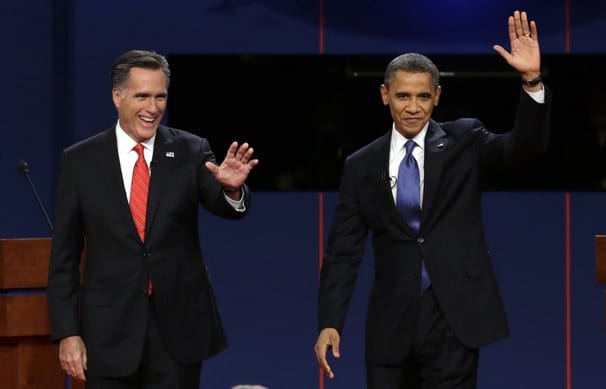 We all want to be loved. That’s a universal truth and something that presidential candidates and all communicators need to consider. It’s a simple, human desire to hope that somebody out there cares about us.
We all want to be loved. That’s a universal truth and something that presidential candidates and all communicators need to consider. It’s a simple, human desire to hope that somebody out there cares about us.
If Republican candidate Mitt Romney’s now infamous “47 percent” quote has any impact on the 2012 election it is this. Regardless of the intent, it suggested that he didn’t care about roughly half the population and was writing them off. It’s got to be tough for undecided voters not to take offense when the language was as blunt as was reported.
Empathy is defined as “the action of understanding, being aware of, being sensitive to, and vicariously experiencing the feelings, thoughts, and experience of another of either the past or present without having the feelings, thoughts, and experience fully communicated in an objectively explicit manner.” In an era when social media exposes all kinds of raw emotion, audiences have come to expect, if not demand empathy.
Throughout history, there are politicians who were considered masters of finding empathy with their audience. In his second inaugural address, Abraham Lincoln shared the pain and loss of a divided nation and called for collective healing: “With malice toward none, with charity for all, with firmness in the right as God gives us to see the right, let us strive on to finish the work we are in, to bind up the nation’s wounds, to care for him who shall have borne the battle and for his widow and his orphan, to do all which may achieve and cherish a just and lasting peace among ourselves and with all nations.”
Ronald Reagan was all about tough love during tough times with the question “Are you better off now than you were four years ago.” Reagan was the caring father figure pushing us to assess the state of our collective lives. At a freewheeling town meeting debate, candidate Bill Clinton stepped towards the audience, responded to a question about the economy personally and said, “I have seen what’s happened in this last four years when in my state, when people lose their jobs, there’s a good chance I’ll know them by their names.” By contrast, candidate Michael Dukakis left his audience cold with a clinical response to a question concerning the hypothetical rape and murder of his wife and his support of an irrevocable death penalty.
Which brings us to the first presidential debate of 2012. How did each candidate fair when it came to expressing empathy with their audience? During 90 minutes that seemed more like a data dump or an economics lesson, it was often a struggle for the candidates to make a personal connection.
Mr. Romney came out strong referencing an unemployed Ohio woman who grabbed his arm and asked, “Can you help me?” He made several additional references to individuals he’d met on the campaign trail, but he later fell into generic references to “the American people.” President Obama hit an emotional cord by describing his hard working grandmother, and how she depended on Social Security. By contrast, Mr. Romney failed to put a face on that audience with general references to “our seniors.” In closing remarks, President Obama referenced the “genius,” “grit,” and “determination” of Americans and promised to fight every day on their behalf. Mr. Romney opted for a list of fixes he promised to make.
In terms of physical cues that might create empathy Mr. Romney spent more time looking at the president, while President Obama took more opportunities to address the audience directly.
Overall, the moments of empathy were spare and felt more staged than genuine in a night peppered with numbers and policy details. It remains to be seen if the town meeting format of the next debate – where candidates will be face-to-face with real people – will increase the level of empathy in the room.
Here’s the problem. Sometimes the message and the messenger can get in the way of creating empathy with your audience. But, what reason do we communicate if not to reach an audience in a personal way? The solution is relatively simple. If the debates are not simply riveting political theater, but a powerful opportunity to emotionally connect with voters, the presidential candidates – and anyone hoping to be a successful communicator – could learn something from legendary TV icon Fred Rogers.
Long a mainstay of public television children’s programming, Rogers summed up his approach and his connection to his young audience in testimony to the U.S. Senate in 1969. “I give an expression of care every day to each child, to help him realize that he is unique,” said Rogers. “I end each program by saying, ‘You’ve made this day a special day by just your being you. There’s no person in the whole world like you. And I like you just the way you are.’ And I feel that if we in public television can only make it clear that feelings are mentionable and manageable, we will have done a great service.”
Rogers’ empathy with his audience paid off. His show ran for decades. Most politicians and communicators could only dream of such a track record.



